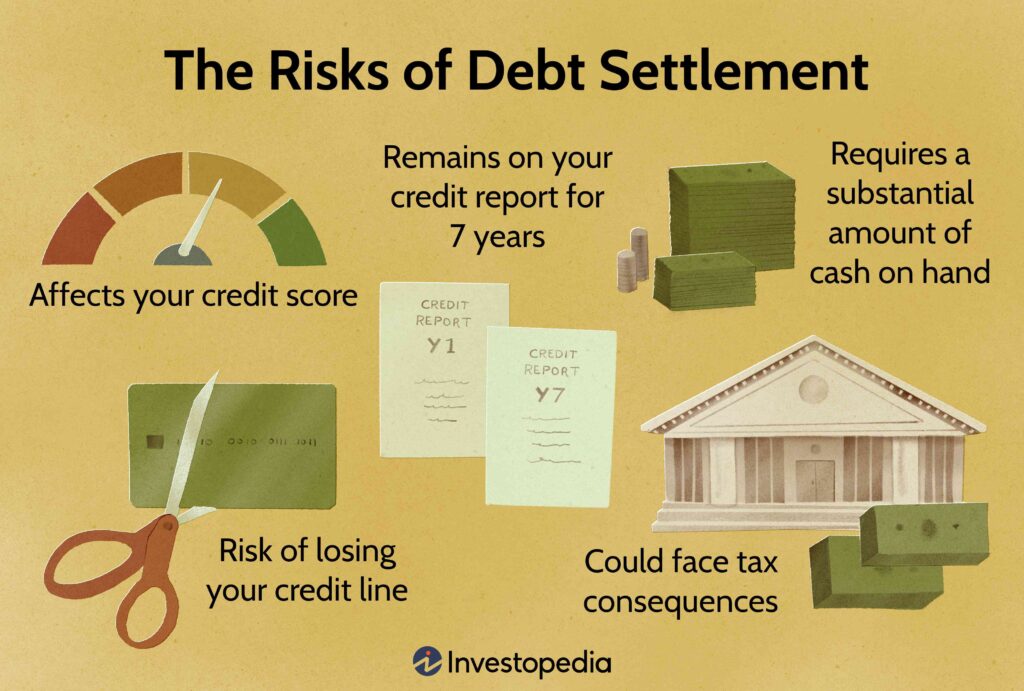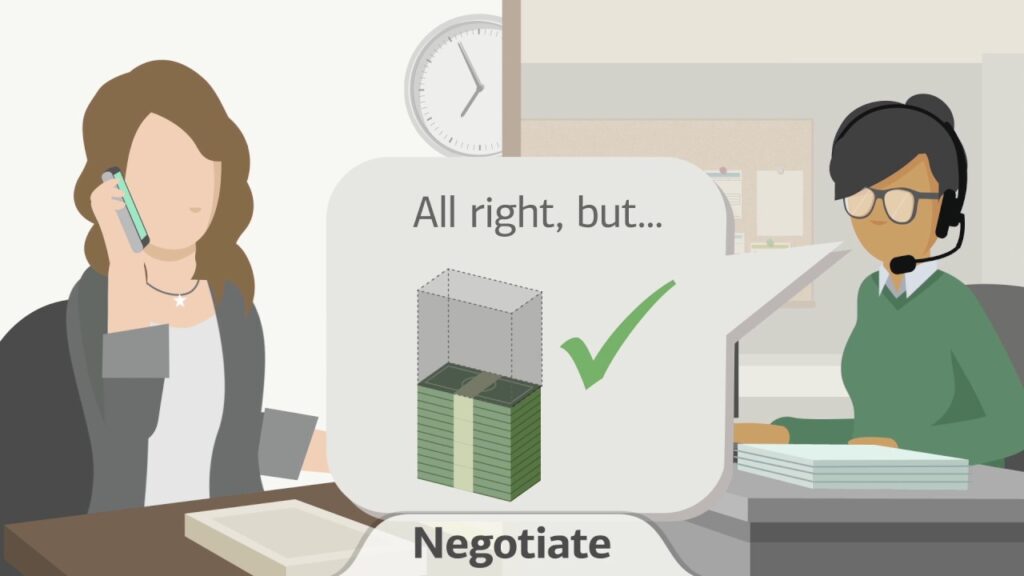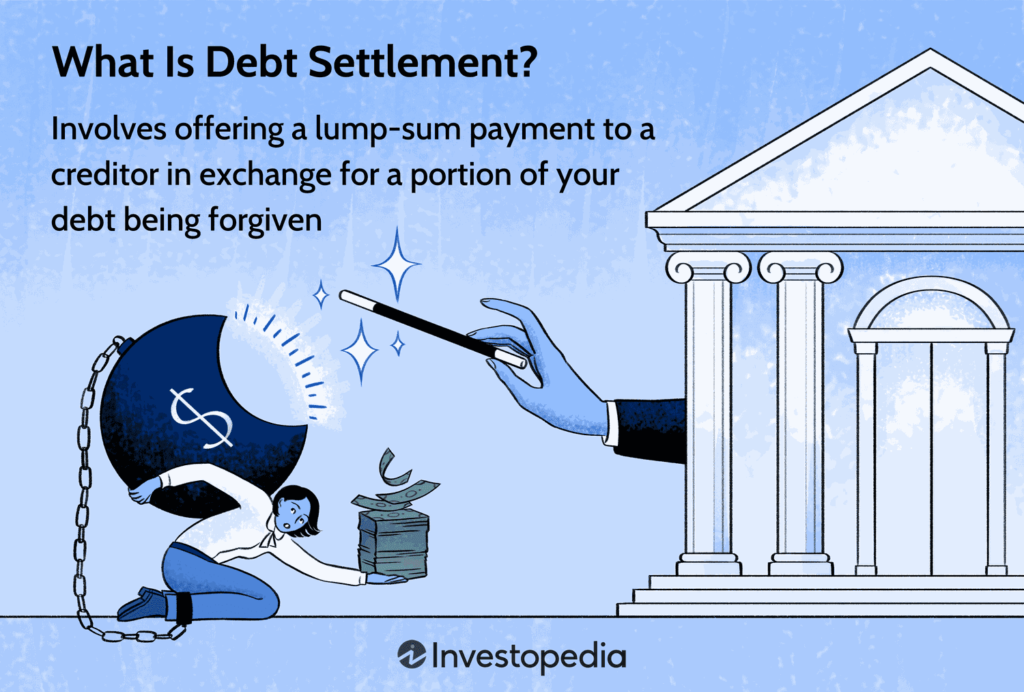In this article, you will learn some valuable tips on how to negotiate with creditors and successfully settle your debts. It can be a daunting task to face your creditors and find a solution, but with the right approach, you can achieve financial freedom. By following these strategies and understanding the negotiation process, you can take control of your debt and work towards a favorable agreement that suits your financial situation.
Firstly, it’s important to gather all the necessary information about your debts, including the total amount owed, interest rates, and any late fees or penalties. This will help you have a clear understanding of your financial situation and enable you to negotiate from an informed position. Next, you should reach out to your creditors and express your willingness to settle the debt. Be honest about your current financial circumstances and explain why you’re unable to make the full payments. This open and transparent communication can help build a rapport with your creditors and increase the chances of them being willing to negotiate. Stay firm, yet flexible, throughout the negotiation process and be prepared to offer what you can realistically afford to pay. With patience and persistence, you can successfully negotiate a settlement that works for both parties involved.

This image is property of www.investopedia.com.
Understanding Creditors and Debts
When it comes to managing your finances, understanding the role of creditors and the different types of debts is crucial. Creditors are individuals or institutions that lend money to borrowers, and debts are the financial obligations that borrowers owe to their creditors. In this article, we will explore the basics of negotiating with creditors and settling debts, helping you take control of your financial situation and move towards financial freedom.
What are creditors?
Creditors can come in various forms, such as banks, credit card companies, mortgage lenders, or even individuals who loaned you money. They provide the funds you need to make purchases or cover expenses when your own financial resources are limited. In return, you agree to repay the borrowed amount, usually with interest, over a specified period of time.
Different types of debts
There are several types of debts that individuals can accumulate throughout their lives. Some common examples include credit card debt, student loans, medical bills, mortgage loans, and personal loans. Each type of debt has its own terms and conditions, repayment options, and consequences for non-payment. Understanding the specifics of your debts is essential when negotiating with creditors.
Importance of negotiating with creditors
Negotiating with creditors can have a significant impact on your financial well-being. It allows you to potentially reduce the amount you owe, negotiate more favorable repayment terms, or even eliminate interest and fees. By reaching a settlement agreement with your creditors, you can ease the burden of your debts and regain control of your finances.
Preparing for Negotiation
Before diving into negotiations, it’s important to take time to prepare. Here are some key steps to follow:
Assessing your debts
Start by assessing the full extent of your debts. Gather all the relevant documents, such as credit card statements, loan agreements, or medical bills, and make a list of your outstanding debts. This will give you a clear overview of your financial situation and help prioritize your debts.
Prioritizing your debts
Not all debts are created equal. Some debts may carry higher interest rates or have more severe consequences for non-payment. Prioritize your debts based on their urgency and potential impact on your financial well-being. For example, paying off high-interest credit card debt might take precedence over other debts with lower interest rates.
Gathering necessary information
To negotiate effectively with your creditors, you need to have all the necessary information at hand. This includes details about the debt, such as the amount owed, the interest rate, the repayment terms, and any additional fees or charges. Being well-informed puts you in a better position to negotiate favorable settlement options.
Setting realistic goals
When entering into negotiations, it’s essential to set realistic goals for yourself. Determine what you hope to achieve through the negotiation process. This could include reducing the amount you owe, securing a lower interest rate, or establishing a more affordable repayment plan. Setting clear goals will help guide your negotiation strategy.
Developing a Negotiation Strategy
Once you have prepared yourself for negotiation, it’s time to develop a strategy. Consider the following steps:
Understanding your financial situation
Before sitting down with your creditors, take a hard look at your financial situation. Evaluate your income, expenses, and any disposable income you have available to put towards debt repayment. Understanding your financial capabilities will help you determine what you can realistically offer during negotiations.
Exploring negotiation options
There are several negotiation options available when dealing with creditors. These can include debt settlement, debt consolidation, or debt management plans. Research each option thoroughly and determine which one aligns best with your financial goals and abilities.
Considering professional help
Negotiating with creditors can be a complex and emotional process. If you feel overwhelmed or unsure about handling negotiations on your own, consider seeking professional help from a credit counseling agency or debt settlement company. These professionals can guide you through the negotiation process and provide valuable expertise and support.
Opening Dialogue with Creditors
Once you have a clear strategy in place, it’s time to open a dialogue with your creditors. Here’s how to approach this step:
Contacting creditors
Start by reaching out to your creditors to initiate the negotiation process. You can do this through phone calls, emails, or by sending a formal written letter. Clearly express your willingness to work towards a mutually beneficial resolution and request an opportunity to discuss your financial difficulties and potential debt settlement options.
Explaining your financial difficulties
During your conversation with creditors, be honest and transparent about your financial situation. Explain any challenges or hardships you are currently facing that make it difficult for you to meet your debt obligations. Providing a clear and concise overview of your financial difficulties can help creditors better understand your situation and be more willing to negotiate.
Requesting debt settlement options
Once you have explained your financial difficulties, request debt settlement options from your creditors. Ask if they would be willing to reduce the amount owed, lower the interest rate, or offer a more manageable repayment plan. Ensure that you clearly communicate your goals and negotiate in a respectful manner to increase the chances of a positive outcome.

This image is property of i.ytimg.com.
Negotiating Debt Settlements
Negotiating debt settlements can be a delicate process. Here’s how to navigate it effectively:
Understanding debt settlement terms
Before finalizing any settlement agreement, make sure you fully understand the terms being proposed. This includes the total amount to be paid, the repayment timeline, and any fees or charges associated with the settlement. Clarify any uncertainties and ask for written confirmation of the agreed-upon terms.
Negotiating favorable repayment terms
When negotiating with creditors, aim to secure the most favorable repayment terms possible. This could involve extending the repayment period to decrease the monthly payment amount, negotiating a lower interest rate, or even requesting a lump sum settlement amount that is less than the total debt owed. Be flexible and open to compromise, but also advocate for terms that align with your goals and financial capabilities.
Reducing or eliminating interest and fees
During negotiations, discuss the possibility of reducing or eliminating interest and fees associated with your debts. High interest rates and additional charges can significantly increase the amount you owe over time. By negotiating for lower rates or fee waivers, you can reduce the overall cost of your debts and make repayment more manageable.
Documenting Agreements
Once you have reached a settlement agreement with your creditors, it’s important to document the terms to ensure both parties are protected. Follow these steps:
Creating a written agreement
Create a written agreement that clearly outlines the terms and conditions of the settlement. Include details such as the total amount to be paid, the repayment schedule, any interest or fees being waived, and any additional conditions agreed upon by both parties. This written agreement serves as a legally binding document that protects both you and your creditor.
Including all agreed-upon terms
Ensure that all agreed-upon terms are included in the written agreement. Double-check for any discrepancies or missing details and make the necessary revisions before signing the document. Both you and your creditor should have a copy of the finalized agreement for future reference.
Reviewing and signing the agreement
Take the time to carefully review the written agreement before signing it. If you have any questions or concerns, seek clarification from your creditor. Once you are satisfied with the terms and understand your obligations, sign the agreement and keep a copy for your records. This finalized agreement will serve as a blueprint for the repayment of your debts.

This image is property of www.investopedia.com.
Meeting Obligations and Paying Off Debts
After reaching a settlement agreement, it’s crucial to fulfill your obligations and work towards paying off your debts. Here’s how to stay on track:
Sticking to the agreed payment schedule
Adhere to the agreed payment schedule outlined in the settlement agreement. Make timely payments in the specified amounts to demonstrate your commitment to clearing your debts. Setting up automatic payments or reminders can help you stay organized and ensure you don’t miss any payments.
Tracking payments and progress
Keep track of your payments and monitor your progress towards debt repayment. This will help you see the impact of your efforts and make adjustments if necessary. Regularly review your statements, account balances, and overall financial situation to ensure you are making steady progress towards your goal of becoming debt-free.
Rebuilding credit after settling debts
While settling your debts can provide financial relief, it may also have an impact on your credit score. After settling your debts, focus on rebuilding your credit by practicing responsible financial habits. Pay your bills on time, avoid accumulating new debts, and consider utilizing secured credit cards or other credit-building techniques. Over time, your credit score can improve, allowing you to regain financial stability and access to better credit opportunities.
Handling Disputes and Challenges
During the debt negotiation process, you may encounter disputes or unexpected setbacks. Here’s how to handle them effectively:
Resolving disagreements with creditors
If you encounter disagreements or disputes during the negotiation process, try to resolve them through open and honest communication. Clearly articulate your concerns and propose alternative solutions. If necessary, consult your written agreement and seek legal advice or mediation to find a resolution.
Addressing unexpected setbacks
Financial setbacks can occur even after reaching a settlement agreement. If you experience unexpected job loss, medical emergencies, or other financial hardships, reach out to your creditors as soon as possible. Explain the situation and discuss potential alternatives or adjustments to your repayment plan. By being proactive and maintaining open lines of communication, you can work towards finding a solution together.
Seeking professional assistance if needed
If negotiations become too challenging or overwhelming, don’t hesitate to seek professional assistance. Credit counseling agencies and debt settlement companies have experience in dealing with creditors and can provide expert guidance. They may be able to negotiate on your behalf and help you navigate complex situations more effectively.

This image is property of www.credit.com.
Avoiding Debt Settlement Scams
While negotiating with creditors can lead to favorable outcomes, it’s important to be aware of potential scams or fraudulent practices. Here’s how to protect yourself:
Recognizing warning signs
Be cautious of any company or individual that promises to eliminate your debts quickly or claims to have secret methods for settling your debts. Avoid those who request large upfront payments or fees before providing any services. Research and thoroughly vet any company or individual before entering into any agreements or transactions.
Researching and vetting debt settlement companies
If you decide to seek professional assistance, research and vet any debt settlement companies before partnering with them. Check their credentials, reviews, and ratings from reputable sources. Verify their accreditation with organizations like the Better Business Bureau and ensure they have a track record of successful debt negotiations.
Protecting yourself from fraudulent practices
Protect yourself from fraudulent practices by carefully reviewing and understanding any contracts or agreements you enter into. Do not provide personal or financial information to untrustworthy sources. Be skeptical of any unsolicited offers or communications and never make payments to individuals or companies that you cannot verify as legitimate.
Conclusion
Successfully negotiating with creditors and settling debts can provide you with the financial freedom you desire. By understanding the role of creditors, assessing your debts, and developing a negotiation strategy, you can take control of your financial situation and work towards a debt-free future. Remember to approach negotiations with transparency, flexibility, and a clear set of goals. With determination and persistence, you can successfully navigate the negotiation process, meet your obligations, and move forward towards a brighter financial future.

This image is property of i.ytimg.com.
